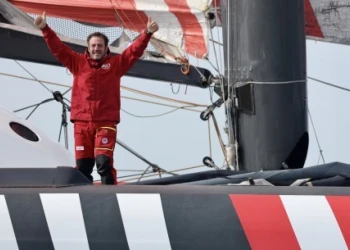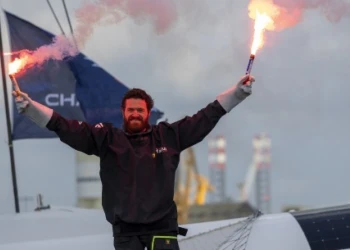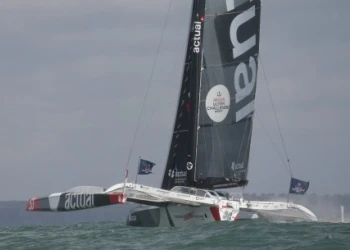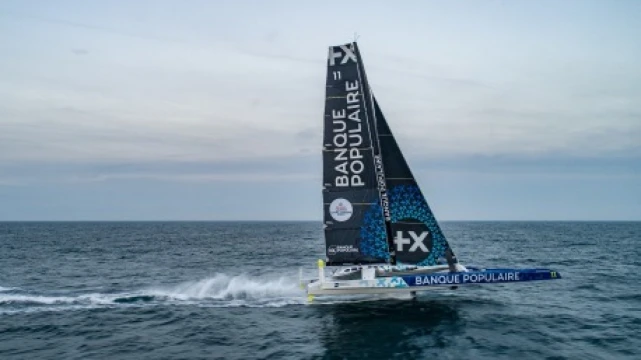
© Jeremie LECAUDEY
Armel Le Cléac'h takes third in the Arkea Ultim Challenge-Brest
Armel Le Cléac'h, winner of the 2016-17 Vendée Globe, maintained his record of finishing on the podium on all three of his solo round the world races so far when he crossed the finish line to complete the ARKÉA ULTIM CHALLENGE-Brest solo multihull race round the world race at 20:31:31hrs this Sunday evening to take third place sailing the ULTIM Banque Populaire XI.
Le Cléac'h's elapsed time for the course is 56 days 08hrs 1min 31secs. He finished 5 days 12hrs 53mins 49 secs after winner Charles Caudrelier.
Third this time is a just reward for his resilience, stamina and dogged determination rather than the proven abilities which have been his trademarks: sustaining high average speeds, wily, assured weather strategies complemented by a deep desire to win.
As he took his finish gun, his face creased into a broad smile and he punched the air, revealing the French skipper's huge measure of relief that he had finally finished the 22,640 nautical miles course.
But while he has quietly revealed his disappointment and frustrations in recent days, tonight his abiding feeling is a keen sense of satisfaction that he and his technical team overcame a series of frustrating technical problems which marred the race of Le Cléac'h and the flagship Banque Populaire team whose skipper was widely tipped as a potential winner.
Le Cléac'h was forced to make two technical stops and only a few days ago had to repair a major leak on the foredeck of the boat which had filled the main hull with water. Of the six strong entry which started from Brest on Sunday 7th January he was the first to pit stop. On the way south he made a technical pitstop in Recife starting on January 14th to fix a foil problem, his tack fitting and damage to his pulpit.
Then, more painfully, on the return ascent of the Atlantic, on February 16th, he went into Rio, Brasil where he ceded second place to Thomas Coville who finished back in Brest on Thursday afternoon.
More recently his delay behind Coville increased when he had to slow right down last Wednesday night into Thursday when he had to make a composite repair to the foredeck of Banque Populaire XI after damage caused by big waves caused a significant ingress of water.
High hopes Pre start hopes and expectations of success for Le Cléac'h and the Banque Populaire XI were raised when the 46 year old and co-skipper Seb Josse won last November's Transat Jaques Vabre race from Le Havre across the Atlantic to Martinique, unveiling a new significant speed edge downwind.
But whilst Banque Populaire XI showed signs of endorsing that potential in the early days of the race, the first technical stop left Le Cléac'h a long, long way behind eventual winner Charles Caudrelier and Coville as he had to struggle with light winds and a very circuitous route round the west of the South Atlantic anticyclone.
He was more than 1500 miles behind Coville when he finally passed the Cape of Good Hope and passed Sodebo Ultim 3 when Coville had to pitstop into Hobart to lead him round Cape Horn but the second pitstop terminated his hopes of second. Approaching Tasmania he made the fastest 24 hours distance of the race at 842 miles, just short of the 851 miles record held by Francois Gabart.
Whilst Coville had to stop for 48 hours to repair his foil down system and his starboard trampoline in Hobart, also missing the worst of a big Southern Ocean storm, Le Cléach also took avoiding action and routed north of New Zealand to avoid the stormy sequence. But when Armel rounded Cape Horn on February 11th for his fourth time solo, his first time on a multihull, after an otherwise fast and furious Indian Ocean and Pacific, he was over 200 miles ahead of Coville. He set the fastest 24 hours on the race, covering 842 nautical miles on the last day of 2023.
"I feel that we are finally leaving the Southern Ocean, that we are getting out of these sometimes difficult conditions that I had for several days. It feels good to find a little bit of civilization, to be nearer land. Now I know that we are going to sail in an area where we are closer to rescue, to be closer to possible logistical support for our boats. That is reassuring."
That second stop in Brazil
After a tough, laborious climb up the South Atlantic Le Cléac'h was forced to make a second technical stopover, in Rio de Janeiro. He had built a margin of over 500 miles over Coville but then he suffered not one but two different successive blows, one to his main rudder and then to his port float rudder, losing the use of both. The port rudder was destroyed and lost on February 13 following a collision with a log of wood and on the 15th, the main rudder disappeared. After just over 48 hours he was back on course.
The compromised performance of his ULTIM and the long periods unfavorable weather conditions tested the exhausted Le Cléach's patience and strength of character. Whilst he remained resolute and determined on Wednesday February 28, the deck of the central hull, probably exhausted by continuous shocks from wave action, gave way after an impact.
"The water really rushed into the central hull. There was a lot of water," he reported, "The boat had to be stopped, the sails furled and lowers and I had to empty it of water. That took a very long time, almost ten hours, then I had to fill the hole, sand it, apply carbon and epoxy. It was a big job.
"And so whilst Le Cléac'h might not have managed to live up to his hopes and dreams of winning the ARKÉA ULTIM CHALLENGE-Brest has proven one of the toughest tests of his career, a real mix of had competition and adventure. His reward is another podium which further enhances his record as France's top solo racer of the last 25 years.
Armel Le Cléac'h's race in numbersFinish time 20:31:31hrs UTC Sunday 03/03/24 Elapsed time: 56 days 08hrs 1min 31secs+5d 12h 53m 49s after first placed Charles Caudrelier Sailed 32,290.79 nautical miles c/w 28,938.03 miles for Caudrelier and 31,217 miles Coville Average speed on the great circle 23,88kts
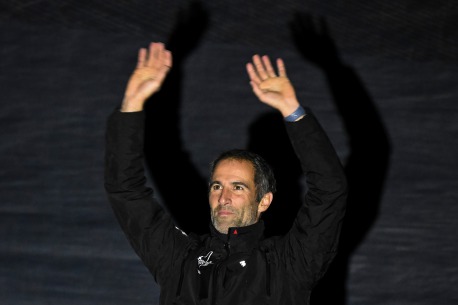
Armel Le Cléac'h interviwed this evening
One would suppose the the adjective 'complicated' sums up your round the world race?
Armel Le Cléac'h: "Exactly, it was a very complicated race for me. It started with the first big damage I had in the first front, then it continued with weather and technical problems. Every time we thought we saw a door opening, it closed, either because the weather was bad or because there was damage. I'm thinking in particular of the rudder damage (torn from the boat after hitting a log, editor's note) when we were sailing back along Argentina. When we left Rio, we thought we would finish the round the world "safely", but there was this rather serious problem with this big leak which caused a lot of problems in the recent days."
It must have felt good to get it finished, the time had come.....I'm a little tired out by all this, it's a bit hard to live with. There was no respite. I have the feeling that everything has gone the wrong way. There was never an opportunity to take advantage of on this round the world. It was really full of challenges and adventures, it's not nothing to go around the world in an Ultim, but it was complicated. As soon as there is a technical problem, as soon as the weather is not good, you have to find other solutions. That weighs on the mind: I came to race to win. In Recife (his first port of call), well really the door closed (for us) and we took a big deficit behind he first two, then Charles who found himself all alone. There was nothing I could do at all to get back at him. We had managed to make up half of our gap on him, and that's when the rudder and main fin broke. Mentally, it's hard because I had really have had 56 days like that. There has always been the goal of finishing, which was the number one objective with the team and with this boat. But let's say it has been an experience...
And it's been tiring....I'm pretty much at the end of my tether... Since Saturday, it's been really hard to sail with a hole in the boat. I put a sail over the hole, but as soon as a wave passes over it, a ton of water enters the boat. I have not slept. The boat was flying again which makes it easier to move forward, but I'm on edge with this breakage. When this happened I though I'm just going to be happy to finish, I'm not going to need rocking to get to sleep! I've gone very far into my reserves in terms of energy...
You have raced three Vendée Globes; Is it harder to race around the world in an Ultim?
It's much more intense to sail these boats because everything is multiplied: the speed, managing maneuvers, the technical planning too. There are moments off, respite periods on a Vendée Globe that you don't have on the ARKEA ULTIM CHALLENGE-Brest. It's just full throttle all the time, and it's really pressing on the skipper. I talked about this with Thomas: it's a real stretch. I have sailed well on this boat, I knew what to expect, but I was well and truly done in.
The speed you were always looking for being behind, is that the hard part? Is it what generates the real big pressure?
What really wears you out mentally, when you do a day at 700 miles, is that you average 35 knots. It really stresses and tires the body and the mind. We are at the extreme of what we can do in offshore racing, at the most difficult. The two sailors who arrived before me have also detailed their adventure, they were very shaken by what they experienced. We're not lying when we say it's demanding. It's hard and, when conditions become difficult or we have technical problems, it adds to the complexity.
You made the best distance over 24 hours, you had some some great speed charges. Were there any really enjoyable moments?
There were some great things, not everything was difficult. I had some great 24 hour speed days. I had the record in my pocket (Armel did 842 miles on January 31st, the record is held by François Gabart, 850.68 miles in 2017), but I had a problem with the rudder, it unscrewed, which meant that the helm was very hard. I had to put my foot on the brake, but I was set to do 40 to 50 miles more than the record. And these stopovers, even if they are hard to live with, generate great encounters. In Recife and Rio, we met people who gave us logistical help. The Pacific was also a good time: it went quickly, we crossed it in a week, which shows the capacity of the boat when everything goes well. I passed Cape Horn at night, but seeing Staten Island in the early morning was a beautiful image.
What assessment do you have of your boat?
I am not disappointed with the boat. We had technical problems that we hadn't have before, and yet we covered many miles, particularly in the Transat Jacques Vabre. Here we have had problems that we didn't ever imagine, and above all, we hit the rudder. The hole in the deck was the final straw. This is the first time we have traveled around the world in an Ultim. There are only so many possibilities for checking the boat, unlike with a crew. We had problems, but the other boats also suffered. And yet, we succeeded in the concept, the race we will probably be 5 boats out of 6 at the finish. It will be a great collective success despite the technical problems.
What have you learned ?
I have a bit the same feeling as at the finish of the Vendée Globe: I have the sensation of having controlled the boat successfully in all imaginable conditions: in 55 knots of wind, upwind... When it comes to tacking, I have managed. I know the boat very well, I know how to work it and trim it even if it is in degraded mode, and it remains incredibly fast. And then there is this famous "resilience"... This ability that we don't know we have withing ourselves how to overcome things. When I felt the boat was full of water, I thought I was going to sink. It was a bit of an absolute emergency, panic and, 12 hours later, the water was emptied, the hole blocked, and we were going again. These are things that we discover, that help us progress and that we cannot work on in training. I learned about the weather, too, with Marcel van Triest and the team, who guide us and give us answers that we don't have."


